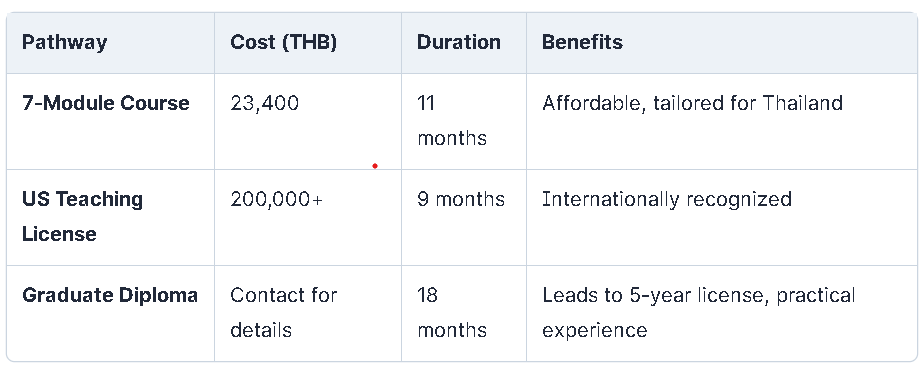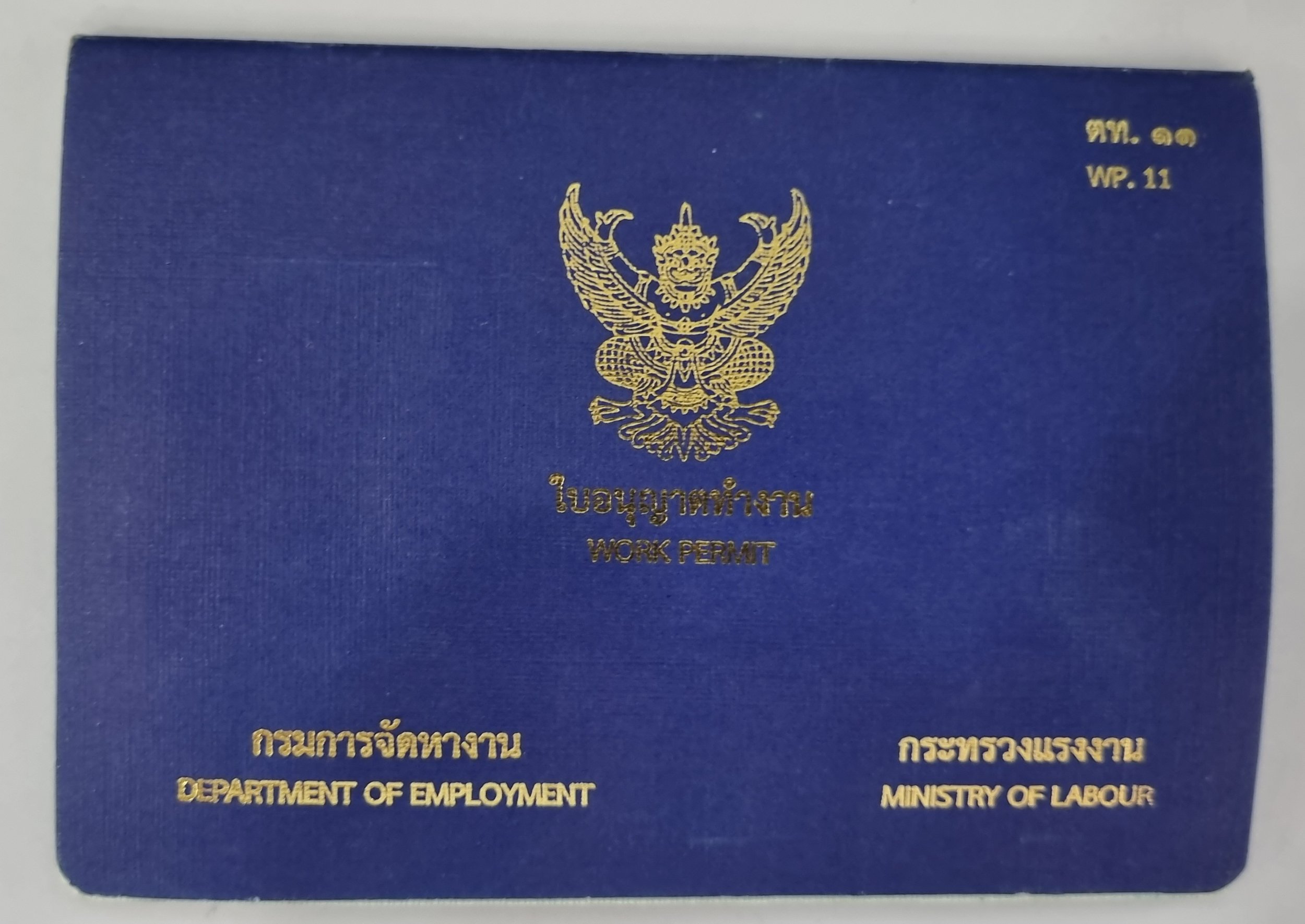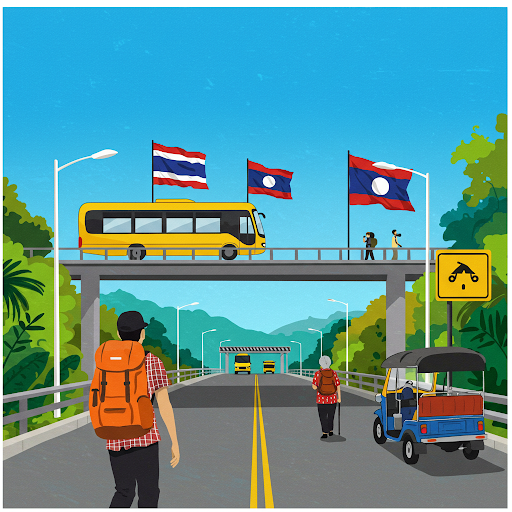TPDI 7-Module Training: Teaching License Thailand — KET
Ready to turn your dream of teaching in Thailand into reality? I’m Matthew, your guide at Kids English Thailand, here to help you navigate the Teacher Professional Development Institute (TPDI) 7-module training curriculum—aka the 7 Modules Krusapa Thailand. This program is your ticket to earning a provisional teaching license (P-License), designed for international/foreign educators with a temporary permit but no education degree. In this detailed guide, I’ll walk you through every step, share must-know tips, and tackle common hurdles to set you on the path to becoming a fully qualified teacher in Thailand.
Let’s jump in and make it happen!
What is the TPDI 7-Module Training Curriculum?
The TPDI 7-module training curriculum, officially the Teachers Professional Knowledge Standards Training Curriculum, is a program developed by the Teacher Professional Development Institute (also referred to as the Teacher Profession Development Institute) under the Teachers Council of Thailand (Khurusapha). It’s designed for teachers who are temporarily exempted from having a regulated profession license, including foreign teachers without an education degree.
The training curriculum helps you meet professional knowledge standards, aligning with the Teachers Council’s goal to enhance the quality of education in private educational institutions and public schools.
This course consists of 7 modules, totaling 420 hours of learning, covering both theoretical learning and practical applications.
Upon completion, you can apply for knowledge certification, which leads to a P-License, allowing you to teach in Thailand legally.
Who Needs the 7-Module Course?
The 7-module course is required for teachers in Thailand who do not have a degree in education. The Teachers Council of Thailand requires all teachers to have a degree in education or to complete their professional training course—like the TPDI 7-module training curriculum—to gain a teaching license. If you’re a foreign teacher with a bachelor’s degree in any field, this training curriculum is your pathway to meeting these requirements.
It’s also ideal for teachers with a temporary permit who need to develop professional knowledge based on the Teachers Council’s standards.
This applies to both Thai and foreign teachers seeking to meet the new regulatory requirements in Thailand.
Step 1: Verify Your Eligibility for the Training Curriculum
Before enrolling in the 7 Modules Krusapa Thailand, confirm your eligibility with the Teachers Council.
Requirement for the 7-Module Course: You must hold a valid temporary permit for professional educators, which is typically arranged by the school where you’ll be employed. The school submits your documents to Khurusapha to obtain this permit.
Temporary Permit Requirements: You need a bachelor’s degree in any field along with an official transcript. These documents must be legalized by your home country’s government and the Thai Embassy. You’ll also need a non-B immigrant visa and evidence of your eligibility to work in Thailand, such as passport copies and your visa.
Temporary License Duration: A temporary teacher’s license in Thailand allows you to work for two years and is renewable up to two additional times, providing a maximum of six years in total. Renewals can occur up to 90 days before the current license expires. However, if you change schools, your current license may be canceled, limiting your total teaching period to five years.
Pro Tip: Work with Kids English Thailand to ensure your school submits the required documents for your temporary permit. We can help you avoid issues like visa overstays or delays in the process.
Step 2: Request Your Desired Training Modules
The TPDI training curriculum offers flexibility in how you approach the 7 modules.
Flexible Registration: Participants can register for the modules gradually, not necessarily in order. This allows you to fit the training around your teaching schedule.
How to Request Modules: Use the module request link to select the modules you want to enroll in. You can also express interest via kspregis.thaijobjob.com.
Support for Issues: If you encounter problems, contact the TPDI Call Center at 0-2257-7149 (press 3) Monday to Friday, 8:30 AM to 5:30 PM, or reach out via LineID: @Thaijobjob. For general inquiries, email info@kurupatana.ac.th
Pro Tip: Plan your module selection based on your availability, as each module has a specific learning period and seminar schedule.
Step 3: Register and Pay for Your Training Modules
Registration for the 7 Modules Krusapa Thailand is managed through an online teaching system called OnePlatform.
Registration Periods: Registration typically opens annually. In 2024, it was from February 26 to March 26 for Cohort 2, and it’s likely to open again in February to March 2025. Check the Khurusapha Facebook page for updates.
Online Platform Requirement: The OnePlatform app must be used for registration and learning activities. Download it by scanning the QR code provided by the Secretariat Office of the Teachers Council of Thailand (available on iOS and Android).
Login Details: Use your passport number as your username. Reset your password via SMS if needed.
Select Modules and Cohort: Choose your training module and cohort based on your schedule.
Registration Fee: The registration fee for each English-language module ranges from 3,000 to 4,000 baht, with the exact cost being 3,200 THB per module. There’s also a one-time processing fee of 1,000 THB for the entire course, totaling 23,400 THB for all 7 modules.
Pay using a QR code for mobile banking (compatible with all banks). If your QR code expires, reselect the module to generate a new one.
Check Payment Status: Monitor your payment status via the OnePlatform app to confirm your enrollment.
Stay Updated: Follow updates via:
OnePlatform app notifications.
Pro Tip: Save your payment confirmation. If you don’t pass a module, you can re-register for that module in the next session.
Step 4: Attend Online Training and Follow the 5-Step Training Procedure
The TPDI training curriculum includes 5 steps to ensure you develop professional knowledge standards.
Orientation
Start with an orientation session to understand the training details.
Meet your homeroom teacher, who will guide you throughout the learning period.
What to Do: Ask questions to clarify expectations.
Watch Videos via LMS (Learning Management System)
Access video content through the OnePlatform app’s LMS.
Each module requires 48 hours of theoretical learning over 6 weeks, which you can complete at your own pace.
Tasks: Complete exams, exercises, and worksheets to test your understanding.
Meet Your Homeroom Teacher
Schedule at least 4 Zoom meetings with your homeroom teacher, typically on weekends.
Use these meetings for personalized feedback on developing learners and improving your teaching practice.
Send Teaching Plans/Clips
Submit lesson plans and teaching clips based on the module’s work context, such as the subjects taught.
Your homeroom teacher will provide suggestions to enhance your learning management skills.
Attend a Seminar
Participate in a 12-hour seminar at the end of each module, involving group activities and discussions.
Final Test Requirement: Complete a final test within seven days of the seminar to pass the module.
Total Hours Required: The entire course requires 420 hours (60 hours per module: 48 hours of theoretical learning, 12 hours of Zoom meetings and seminars), taking about 11 months to complete.
Module Structure: Each module focuses on a specific area, such as changing global context, educational psychology, developmental psychology, counseling psychology, digital technology in education, and the Thai language for communication.
Pro Tip: Stay organized by setting reminders for Zoom meetings, seminars, and final tests.
Use the User Manual for Teachers Professional Knowledge Standards Training for guidance.
Self-Study (Theoretical Learning): 48 hours
Zoom Meetings & Seminar: 12 hours
Total per Module: 60 hours
Total for 7 Modules: 420 hours
Step 5: Receive Your Certificate and Plan Your Next Steps
After completing each module, you’ll receive a certificate. Here’s what to do next:
Collect Certificates: Keep your certificates safe as proof of your progress.
Eligibility for Provisional License: Once you’ve completed all 7 modules, apply for knowledge certification. If successful, you’ll receive a P-License, allowing you to teach in private educational institutions and public schools.
Recent Licensing Update: As of January 2025, teachers who have completed at least 4 modules can apply for a 2-year temporary teaching license, giving you more time to finish the remaining modules.
Training for Permanent License: Completion of the required training curriculum is essential for moving from a temporary to a permanent teaching license in Thailand.
Transition Period Opportunity: If you were teaching in Thailand before the 7-module course was introduced in 2023, you can apply for a fourth or fifth temporary license during the transition period to the new system, extending your ability to teach legally.
Pro Tip: Kids English Thailand can help you navigate the application process for your P-License and beyond.
Alternative Pathway: Graduate Diploma in Teaching Profession at St. Teresa International University
If the TPDI 7-module course doesn’t suit your needs, another option is the Graduate Diploma in Teaching Profession offered by St. Teresa International University, the first private institution in Thailand to offer this program in English for foreign teachers.
How to Register: You can register for this program at St. Teresa International University’s Graduate Diploma in Teaching Profession page. The program consists of 12 courses (34 credit hours) over three terms, including internships at local schools in the last two semesters for real-world teaching experience.
Waiver Process: After registering, present your receipt to the Teachers Council of Thailand. If you’re on a temporary permit, this allows you to obtain a 2nd or 3rd waiver, extending your legal teaching period while you study.
Program Fees: Specific tuition fees for the program are not publicly listed, but given its structure (18 months, 12 courses, and internships), costs may be higher than the TPDI 7-module course (23,400 THB total). Additional expenses may include application fees, internship-related costs, and examination fees for the licensing exam. For the most accurate and up-to-date fee information, contact St. Teresa’s admissions team at (+66) 086-338-0696 or email admissions@trsu.ac.th
Program Benefits: The 18-month program covers courses like Principles of Teaching Profession, Self-Actualization for Teachers, Language and Culture for Teachers, Psychology for Teachers, and Curriculum and Learning Management, focusing on educational innovation, digital technology, and learning measurement.
Eligibility for a 5-Year License: Upon graduation, you’ll be eligible to take the licensing exam from the Teachers Council of Thailand. Passing this exam grants you a permanent teaching license, valid for 5 years and renewable, allowing you to teach in public or private schools in Thailand.
Additional Requirements: You must be a school teacher with a valid employment contract or temporary teaching permit at the time of admission, and you’ll need to submit documents like your passport, degree certificate, and English proficiency test results (e.g., TOEFL, IELTS).
What Are the Modules About?
Each module in the 7 Modules Krusapa Thailand addresses a key area of professional knowledge:
Changing Global Context: Learn about global trends, society, and the Thai sufficiency economy philosophy. Explore concepts shaping modern education.
Developmental Psychology, Educational Psychology, and Counseling Psychology: Focus on developing learners according to their capabilities through developmental psychology, educational psychology, and counseling psychology.
Subjects Taught and Learning Management: Explore curriculum design, teaching science, and digital technology in education to manage the subjects taught effectively.
Measurement, Assessment, and Research: Study assessment of learning outcomes, research, and problem solving for learners’ development.
Thai Language and Communication: Develop skills in Thai language and English for communication, plus digital technology for education.
Educational Quality Assurance: Learn to design and implement quality assurance in education.
True Spirit and Professional Code: Understand the professional code of ethics and the true spirit of a qualified teacher.
Challenges with the 7-Module Course
Some teachers have reported challenges with the 7 Modules Krusapa Thailand:
Language Barriers: A Reddit post from September 2024 notes that some teachers struggled with the Thai-language interface of the OnePlatform app, despite the course being in English.
Theoretical Focus: The content can feel overly theoretical, with less emphasis on practical teaching.
Delays: While delays in the English-language version were an issue in early 2024, the program has since progressed.
How to Navigate: Use translation tools for the app, focus on applying the theoretical learning to your teaching, and stay proactive with updates from TPDI.
Alternative Pathway: US Teaching License
If the TPDI 7-module course or the Graduate Diploma in Teaching Profession isn’t the right fit, you can consider a US teaching license:
US Teaching License: Programs like TeacherReady ($6,500) or Moreland/TeachNow ($7,300) offer a US teaching license in about 9 months. However, as of February 2025, the Office of Higher Education Commission (OHEC) in Thailand is not issuing equivalency certificates, which may delay licensing.
Training Models: There are two models for the 7-module course: attendance (completing all modules) and professional experience equivalency (if you have significant teaching experience).
Contact the TCT to explore the training model selection process.
Practical Tips for Teaching in Thailand
Here are some tips to help you settle in and succeed as a teacher in Thailand:
Understand the Thai Education System: If you’re teaching at a secondary school, you might work with students in Grade 7 (Matthayom 1), the start of lower secondary education for students aged 12–13.
Thailand follows a 6-3-3 education system (6 years of primary, 3 years of lower secondary, 3 years of upper secondary).
Grade 7 students study core subjects like Thai language, math, science, and English, preparing them for further education. Knowing this can help you tailor your lessons to their needs.
Cost of Living: A basic lifestyle in Bangkok costs 20,000–30,000 THB per month. Salaries range from 30,000–150,000+ THB depending on the school.
Cultural Adaptation: Learn to “wai” and smile to build relationships. Be prepared for a relaxed approach to time.
Learning Thai: Basic Thai language skills can help with daily life and teaching. Consider taking lessons with a qualified teacher.
FAQ: Common Questions About the TPDI 7-Module Course and Teaching in Thailand
Here are answers to frequently asked questions about the 7 Modules Krusapa Thailand and teaching in Thailand:
What Are the Requirements for Kurusapa Thailand?
The Teachers Council of Thailand (Kurusapha) sets the requirements for teachers in Thailand:
Teacher Qualifications: The Teachers Council of Thailand requires all teachers to have a degree in education or to complete their professional training course—such as the TPDI 7-module training curriculum—to gain a teaching license.
Professional Development Opportunities: The Teacher Professional Development Institute offers training for both Thai and foreign teachers to meet these requirements.
Temporary Permit Requirements: Teachers with a temporary permit must develop professional knowledge through this training curriculum.
Professional Standards Monitoring: The Teachers Council monitors teaching practices to enhance education quality, focusing on areas like learning outcomes, problem solving, and learners’ development.
How to Get a 5-Year Teaching License in Thailand?
Through the TPDI 7-module course, after obtaining your P-License by completing the 7 modules, you can take the Teacher Professional Competency Testing and Assessment to earn a B-License, which is valid for 5 years and renewable. This license aligns with the professional code of ethics and the true spirit of a qualified teacher.
Alternatively, by completing the Graduate Diploma in Teaching Profession at St. Teresa International University, you can take the licensing exam upon graduation to obtain a permanent teaching license, valid for 5 years and renewable.
What is Grade 7 in Thailand?
In Thailand, Grade 7 (Matthayom 1) marks the start of lower secondary education, typically for students aged 12–13. It’s part of the 6-3-3 education system (6 years of primary, 3 years of lower secondary, 3 years of upper secondary). Grade 7 students study core subjects like Thai language, math, science, and English, preparing them for further education.
Can I Skip the 7-Module Course with a Teaching License from My Home Country?
Yes, if you have a teaching license from your home country (e.g., UK QTS, PGCE, or a US state license), you may be able to skip the 7-module course and apply directly for a P-License or B-License. However, post-COVID changes may require additional steps, such as passing a TCT exam. Contact the Teachers Council to confirm your qualifications.
What Happens If I Fail a Module?
If you don’t pass a module, you can re-register for that module in the next session. The TPDI system is designed to support your growth as a teacher.
How Do I Renew My Temporary Teaching License?
You can renew your temporary teaching license up to 90 days before it expires. If you’ve enrolled in the 7-module course, you may be granted new waivers as long as you maintain your intention to complete the modules. Alternatively, registering for the Graduate Diploma in Teaching Profession at St. Teresa International University allows you to obtain a 2nd or 3rd waiver by presenting your receipt.
Conclusion 7 Modules
The TPDI 7-module training curriculum and the Graduate Diploma in Teaching Profession at St. Teresa International University offer cost-effective pathways to earn a teaching license in Thailand, with the former totaling 23,400 THB for 420 hours of training. Both programs provide flexibility in registration, access to online learning platforms, and options for extended waivers, such as the 2-year temporary license after 4 modules in the TPDI program or the 2nd/3rd waiver through St. Teresa.
At Kids English Thailand, we’re here to support you through the process, from obtaining your temporary permit to securing your P-License or a 5-year permanent teaching license. Start your journey today, and share your experience in the comments below!
Final Thoughts
We hope this post has inspired and empowered you on your teaching journey in Thailand! Kids English Thailand is here to support you with tips, insights, and resources to make your experience truly amazing. Want to dive deeper or have questions? Check out our related posts below, or connect with our community of educators making a difference in Thailand. Let’s keep thriving together!
























